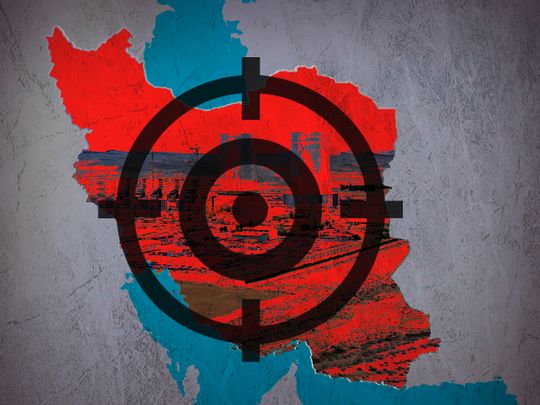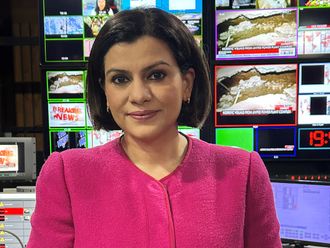
If US Secretary of Defence Lloyd Austin’s visit to Israel this week was meant to restrain Prime Minister Benjamin Netanyahu’s anti-Iran actions then the answer was ready for him as he arrived. On Sunday Iran announced that its top secret uranium enrichment facility at Natanz suffered a power blackout as a result of sabotage.
Whether it was a cyberattack or a deliberate explosion, Iran’s Foreign Minister Mohammad Javad Zarif was quick to point the finger at Israel. A number of Israeli sources confirmed that it was a carefully planned operation.
In a press conference with Austin on Monday, Netanyahu said that “Iran must never possess nuclear weapons. My policy as prime minister of Israel is clear — I will never allow Iran to obtain the nuclear capability to carry out its genocidal goal of eliminating Israel.”
Netanyahu’s position on the 2015 Iran nuclear deal is not new. He has opposed it even before it was signed and challenged the Obama administration by directly making his case before a joint session of Congress in March 2015.
Trump’s unilateral withdrawal from JCPOA
He supported Donald Trump’s unilateral withdrawal from the international agreement in 2017 and criticised Joe Biden’s election vow to rejoin it. The Natanz incident is a blow to Iran’s declaration that it was raising the rate of uranium enrichment in a clear breach of the deal.
But more importantly it puts additional obstacles before the Vienna talks where the US and its allies are trying to find a way to revive the deal. So it is also important for the US to take Israel in confidence. Both countries decided to hold a second round of strategic talks on Tuesday; a day before the resumption of the Vienna negotiations.
Israeli attempts to derail the talks are not new. Last week and as Iran and the US held indirect talks in the Austrian capital, Tehran announced that an Iranian tanker was hit in the Red Sea. Again there was finger pointing. Both countries have been engaged in a shadow war in the sea — Iran struck an Israeli cargo ship in the Arabian Sea last March — and on land in Syria and possibly Iraq. Last November Israeli agents allegedly killed Iran’s top nuclear official Mohsen Fakhrizadeh near Tehran.
Iran vowed to retaliate for this week’s incident and Israeli analysts believe that it will. A senior Israeli military official said on Sunday that Israel will hold exercises that mimic an attack on Iran’s nuclear facilities.
This escalation is bad news for the Biden administration, which wants to rejoin the nuclear deal and put strains on Iran’s nuclear program. It also wants to expand the agreement to cover Iran’s regional behaviour and its controversial ballistic arsenal.
Iran's uranium enrichment activity
his is also the position of America’s European and regional allies. It would be a mistake to allow the Iranians to continue their uranium enrichment activities without international inspection. Tehran’s stand may have been emboldened by Russian and Chinese backing. Both Germany and Russia expressed concern that the Natanz incident may further complicate the Vienna process.
Iran’s position has been adamant: It wants the US to lift all economic sanctions and without conditions for it to return to the nuclear agreement. The US, reportedly, had offered a partial lifting of the sanctions that are directly linked to Iran’s nuclear program. Others, also imposed by the Trump administration, are related to Iran’s human rights record.
The US wants to reach a deal before next June Iranian presidential elections where a hard line candidate is likely to replace President Hassan Rouhani. The elections may also decide the committee that will choose the successor of Iran’s Supreme Leader Ali Khameini.
For now Biden faces a tough Israeli leader who is also using the Iranian card to appeal to Israeli right wing voters and parties. He is unlikely to make concessions to the White House at this point. He also has the backing of several pro-Trump Republicans in the US Congress who flatly oppose rejoining the nuclear deal.
Many analysts note that years of Trump’s “maximum pressure” policy may have failed to change Iran’s attitude or limit its nuclear program. There is speculation that the Natanz incident may only drive the country’s nuclear activities deeper underground and raise its security levels.
The coming days will bring about dire tests to the strategic US-Israeli ties. They have been strained before, under Obama, but Netanyahu survived. Biden’s options appear limited at this point and Netanyahu’s maverick attitude may end up diffusing any chance of salvaging the Iran nuclear deal.
While nothing can be said with finality but it is likely that the escalation may put Iran and Israel on a dangerous collision course.
Osama Al Sharif is a journalist and political commentator based in Amman.








